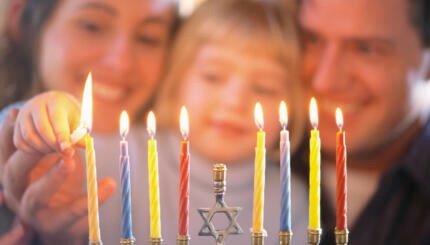Thank you: two simple words with tremendous meaning. Thank you for being part of our community. Thank you for raising your children with us. Thank you for being with us.
Many of us are seeking meaning in our lives and wish to be valued for the contributions we make and the people we are. While the Jewish community has traditionally struggled with welcoming interfaith families, the High Holidays present the perfect opportunity for us to put our values into action and express our gratitude to interfaith families for the investments they make in the Jewish future.
Interfaith families are a growing part of our community. Many are seeking meaning in a Jewish context. Many are exposing their children to Jewish customs and rituals, and are doing their part to transmit Jewish values and traditions to their children. Many are active members of our congregations. For such a family that chooses us and asks only to be accepted in return, why shouldn’t we extend that acceptance?
The High Holidays beckon us to examine ourselves. This is our annual accounting to determine if we have lived up to our potential. We engage in Teshuvah (repentance), Tefillah (prayer) and Tzedakah (acts of justice and giving) as a way to keep us on the right path to being our best selves and contribute to making our society and the world a better place. These themes translate into how we may specifically welcome interfaith families during this new year.
Teshuvah: An opportunity to open our hearts and our doors widely to truly welcome all families who wish to be part of our communities. Too often I hear stories of how people have felt rejected and denied a place within a Jewish community because they fell in love with someone who isn’t Jewish. Teshuvah is a way for us to mend our past communal mistakes. Welcome those who wish to be welcomed and support them on their personal journeys as they explore Judaism in their own way.
Tefillah: The chance to acknowledge with blessings that every member of a Jewish family is valued. Many rabbis invite those members of our community who aren’t Jewish and are a link in the chain of transmission of Jewish values and traditions to their children to rise and receive a blessing to honor their commitment to Jewish life and heritage. This has a profound impact and speaks volumes about the type of community we are and can reinforce why someone would choose to be affiliated with us.
Tzedakah: Working for justice in our world is a Jewish priority that is shared with people of many faiths. As we strive to help those who are vulnerable in our communities by performing acts of tzedakah, why not actively seek to engage every member of our community, Jewish or not? A personal invitation says with sincerity that the person who isn’t Jewish is respected. It says to their Jewish partner that we value both their participation in and contributions to our community.
Thousands of families will come together in observance of Rosh Hashanah and Yom Kippur. What better time for synagogues and communities to reflect their intent to be welcoming and inclusive by publicly acknowledging and thanking the members of interfaith families who join them?
“Al chet shechatanu l’fanecha,” for the sin we have committed against You: As we recite these words asking forgiveness for our transgressions of the past year, may we also be mindful of how we have missed the mark by alienating interfaith families. As we seek to begin anew, may our hearts be big enough to embrace all God’s children, recognizing their contributions to our communities and our world, and may we be humble enough to tell them “thank you.”



